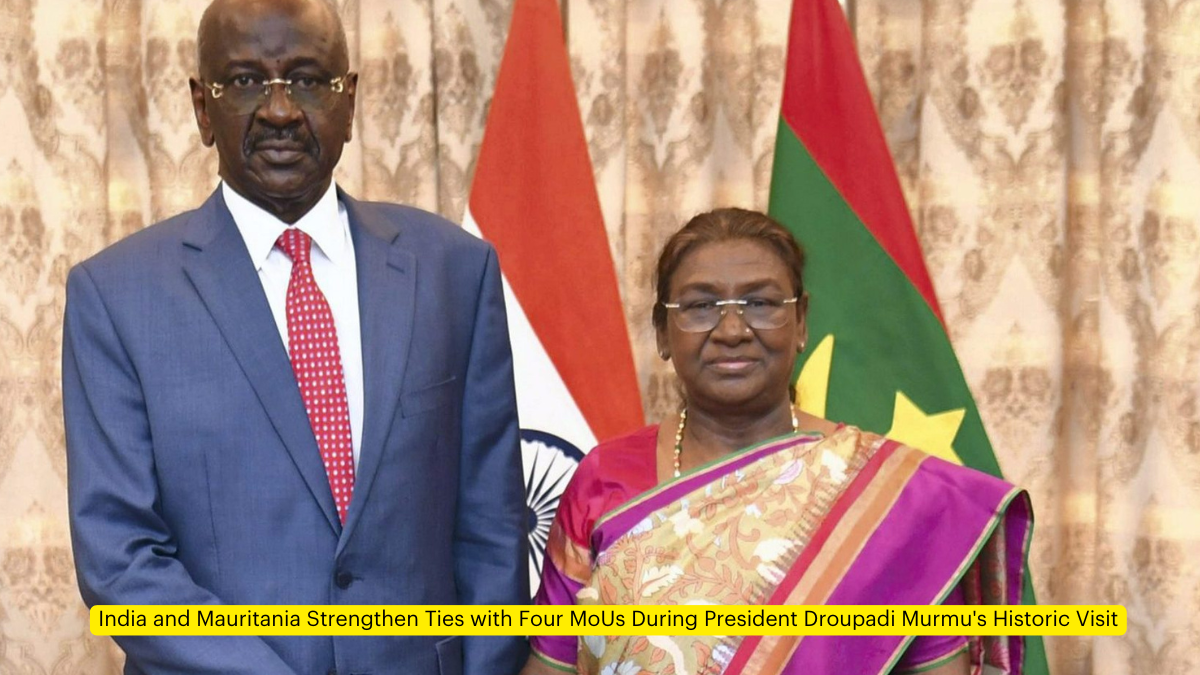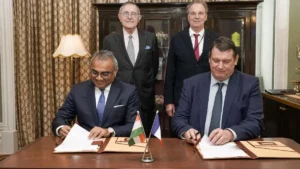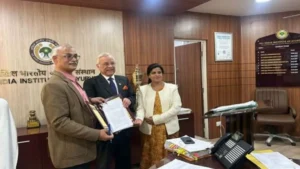India and Mauritania have taken a significant step towards enhancing their bilateral relations by signing four Memorandums of Understanding (MoUs) during Indian President Droupadi Murmu’s visit to the North African country. This visit, a historic moment in Indo-African diplomacy, marked the first time an Indian president set foot in Mauritania, as part of President Murmu’s three-nation tour, which also includes Algeria and Malawi.
President Droupadi Murmu’s Three-Nation African Tour
President Murmu’s African visit, spanning from 13-17 October 2024, aimed at solidifying India’s relationships with key African nations. Her tour started with a three-day official visit to Algeria, from 13-15 October 2024, followed by her arrival in Mauritania on 16 October 2024. The third and final leg of her tour is scheduled for Malawi.
During her visit to Mauritania, President Murmu was warmly received at the Nouakchott-Oumtounsy International Airport by Mauritania’s President, Mohamed Ould Cheikh Ghazouani. This warm reception set the tone for discussions between the two nations, with the focus on deepening and broadening their bilateral cooperation.
Bilateral Discussions and Signing of MoUs
The highlight of President Murmu’s visit was her meeting with President Ghazouani at the Presidential Palace in Nouakchott. The discussions revolved around various key issues that concern both nations, including economic cooperation, cultural exchanges, and diplomatic relations.
During the visit, four MoUs were signed between India and Mauritania, aiming to enhance collaboration in multiple areas. These MoUs focused on:
- Training of Diplomats – Establishing a framework for capacity-building and exchange of knowledge between the foreign services of both countries.
- Cultural Exchange – Fostering mutual understanding and appreciation through cultural programs, exhibitions, and artist exchanges.
- Visa Exemption – Offering visa exemptions for diplomatic and official passport holders to facilitate smooth diplomatic engagements.
- Foreign Office Consultations – Enhancing regular consultations between the foreign offices of both nations to ensure continuous dialogue on bilateral and international issues.
These agreements mark a significant boost to India-Mauritania ties, which have been growing stronger since the establishment of India’s embassy in Nouakchott in June 2021.
President’s Address to the Indian Community in Mauritania
Later in the day, President Murmu addressed the small Indian community residing in Mauritania during a reception hosted by the Ambassador of India to the country. The Indian diaspora plays a crucial role in fostering people-to-people ties, and President Murmu’s interaction with them emphasized India’s commitment to supporting its citizens abroad.
Overview of India-Mauritania Relations
India’s relationship with Mauritania has witnessed steady growth over the past few years. The two countries held their first Foreign Office Consultations in Nouakchott on 21 March 2024, further underlining the importance both nations place on diplomatic dialogue.
In terms of trade, the bilateral relationship has been gradually expanding. In the financial year 2022-23, the total bilateral trade stood at $378.24 million, with India’s exports to Mauritania amounting to $146.57 million and imports at $231.68 million.
India mainly exports:
- Cereals
- Pharmaceuticals
- Plastic products
- Cotton
- Ceramics
- Iron and steel articles
- Boilers and mechanical appliances
- Electrical products
- Chemicals
Mauritania, in turn, exports key resources to India, including:
- Iron and steel
- Copper
- Aluminium
- Electrical machinery
These trade figures highlight the complementarity between the two economies and the potential for further growth in sectors such as infrastructure, technology, and renewable energy.
The Geopolitical and Economic Importance of Mauritania
Mauritania, an Islamic republic located along the Atlantic Ocean in Northwest Africa, is a strategically important country that acts as a transitional zone between Arab North Africa and the sub-Saharan African region. It is a member of the Maghreb region, which includes countries like Algeria, Morocco, and Tunisia.
Although Mauritania is one of the poorer nations in Africa, largely desert-bound and with a significant nomadic population, it holds substantial reserves of natural resources, including iron ore, copper, gypsum, and some oil resources. The country’s economic potential, particularly in mining and energy, presents opportunities for foreign investment, including from India.
Historical Context
Mauritania was formerly a colony of France and gained its independence in 1960. Like many former French colonies in Africa, it faces significant challenges related to development, governance, and poverty. However, its strategic location, mineral wealth, and growing ties with major economies like India are key to its future progress.
Key Takeaways from President Murmu’s Visit
- Deepening Diplomatic Ties: The signing of four MoUs signals a concerted effort by both India and Mauritania to enhance cooperation in diplomatic, cultural, and economic spheres. The training of diplomats and visa exemption MoUs will streamline diplomatic exchanges, making it easier for officials to engage with their counterparts in both nations.
- Cultural Diplomacy: The cultural exchange MoU highlights India’s soft power approach in Africa, promoting mutual understanding and cultural collaboration. This can help bridge cultural gaps and foster long-term goodwill between the populations of both countries.
- Economic Opportunities: The Foreign Office consultations and growing trade links point to a future where economic ties between India and Mauritania could expand significantly. India’s exports of pharmaceuticals and cereals are critical for a developing nation like Mauritania, while India’s imports of iron, steel, and copper benefit India’s growing industrial sector.
Summary of the News
| Attribute | Details |
|---|---|
| Between Whom | Government of India and Government of Mauritania |
| If Organization then Facts | No specific organizations mentioned; agreements were intergovernmental |
| Amount | Not applicable |
| Target/Aim | Strengthening bilateral relations through enhanced diplomatic, cultural, and economic cooperation |
| MoU Detailing | 1. Training of Diplomats – Facilitates the exchange of knowledge and capacity-building between the foreign services of India and Mauritania. 2. Cultural Exchange – Promotes mutual understanding through cultural programs, exhibitions, and artist exchanges. 3. Visa Exemption for Diplomatic/Official Passports – Eases travel for diplomatic and official personnel to foster smoother diplomatic relations. 4. Foreign Office Consultations – Establishes regular consultations between the foreign offices of both nations to enhance communication and cooperation on bilateral and global issues. |
| Key Beneficiaries | 1. Diplomats and Foreign Service Personnel – Enhanced training opportunities and smoother travel for official purposes. 2. Cultural Sectors – Increased cultural exchange programs benefit artists, cultural institutions, and promote intercultural understanding. 3. Business and Trade Sectors – Foreign Office consultations facilitate smoother economic engagement, which can benefit sectors such as pharmaceuticals, mining, and energy. 4. Indian and Mauritanian Nationals with Diplomatic/Official Roles – Visa exemptions facilitate travel, fostering increased diplomatic cooperation. |




 Why the Adani-Marseille Pact Could Be a ...
Why the Adani-Marseille Pact Could Be a ...
 AIIA Signs MoU with General Insurance Co...
AIIA Signs MoU with General Insurance Co...
 Bharat Taxi Partners with AAI to Launch ...
Bharat Taxi Partners with AAI to Launch ...








